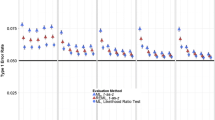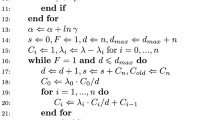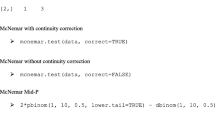Abstract
When the results of biological experiments are tested for a possible difference between treatment and control groups, the inference is only valid if based upon a model that fits the experimental results satisfactorily. In dominant-lethal testing, foetal death has previously been assumed to follow a variety of models, including a Poisson, Binomial, Beta-binomial and various mixture models. However, discriminating between models has always been a particularly difficult problem. In this paper, we consider the data from 6 separate dominant-lethal assay experiments and discriminate between the competing models which could be used to describe them. We adopt a Bayesian approach and illustrate how a variety of different models may be considered, using Markov chain Monte Carlo (MCMC) simulation techniques and comparing the results with the corresponding maximum likelihood analyses. We present an auxiliary variable method for determining the probability that any particular data cell is assigned to a given component in a mixture and we illustrate the value of this approach. Finally, we show how the Bayesian approach provides a natural and unique perspective on the model selection problem via reversible jump MCMC and illustrate how probabilities associated with each of the different models may be calculated for each data set. In terms of estimation we show how, by averaging over the different models, we obtain reliable and robust inference for any statistic of interest.
Similar content being viewed by others
References
Aeschbacher H.U., Vuataz L., Sotek J., and Stalder R. 1977. The use of the beta-binomial distribution in dominant-lethal testing for weak mutagenic activity (Part I). Mutation Reserach 44: 369-390.
Bernardo J.M. and Smith A.F.M. 1994.Bayesian Theory. Wiley, New York.
Brooks S.P. 1998. Markov chain monte carlo method and its application. The Statistician 47: 69-100.
Brooks S.P. and Morgan B.J.T. 1994. Automatic starting point selection for function optimisation.Statistics and Computing 4: 173-177.
Brooks S.P., Morgan B.J.T., Ridout M.S., and Pack S.E. 1997. Finite Mixture Models for Proportions. Biometrics53: 1097-1115.
Brooks S.P. and Roberts G.O. 1998. Diagnosing convergence of markov chain Monte Carlo algorithms. Statistics and Computing 8: 319-335.
Garren S.T., Smith R.L., and Piegorsch W.W. 2000. Bootstrap goodness-of-fit test for the beta-binomial model. Biometrics, in press.
Gelman A. and Rubin D.B. 1992.Inference from iterative simulation using multiple sequences. Statistical Science 7:457-511.
Green P.J. 1995. Reversible jump MCMC computation and Bayesian model determination. Biometrika82: 711-732.
Haseman J.K. and Soares E.R. 1976. The distribution of fetal death in control mice and its implications on statistical tests for dominantlethal effects. Mutation Research 41: 277-288.
Lee J.C. and Sabavala D.J. 1987. Bayesian estimation and prediction for the beta-binomial model. Journal of Business and Economic Statistics 5: 357-367.
Morgan B.J.T. 1992. Analysis of quantal response data. Chapman and Hall.
O'Hagan A.O. 1998. Eliciting expert beliefs in substantial practical applications. The Statistician 47: 21-36.
Prentice R.L. 1986. Binary regression using an extended beta-binomial distribution, with discussion of correlation induced by covariate measurement error. Journal of the American Statistical Association 81: 321-327.
Richardson S. and Green P.J. 1997. On Bayesian analysis of mixtures with an unknown number of components. Journal of the Royal Statistical Society, Series B 59: 731-792.
Williams D.A. 1982. Extra-binomial variation in logistic linear models. Applied Statistics 31: 144-148.
Author information
Authors and Affiliations
Rights and permissions
About this article
Cite this article
Brooks, S.P. On Bayesian analyses and finite mixtures for proportions. Statistics and Computing 11, 179–190 (2001). https://doi.org/10.1023/A:1008983500916
Issue Date:
DOI: https://doi.org/10.1023/A:1008983500916




